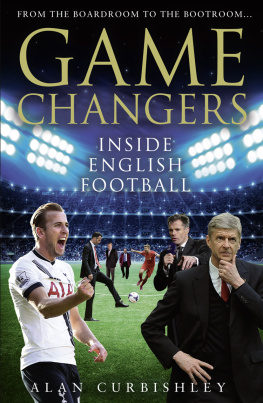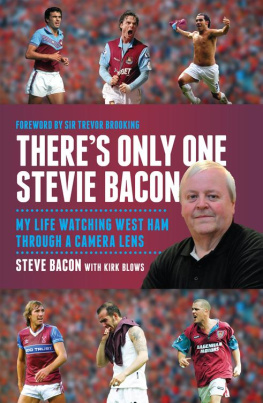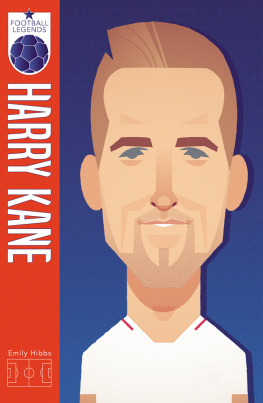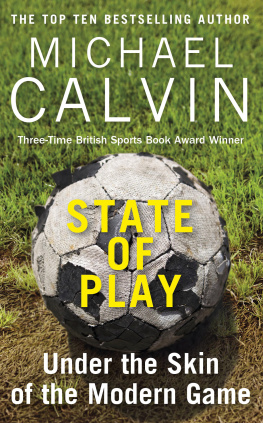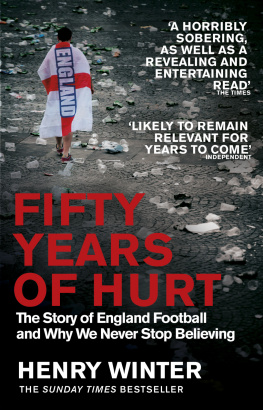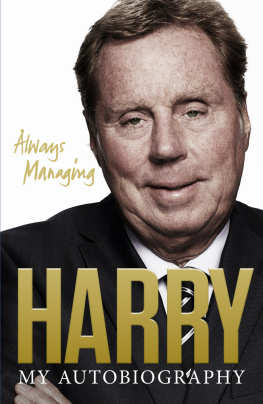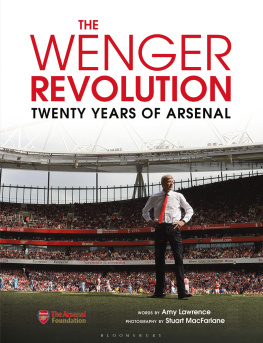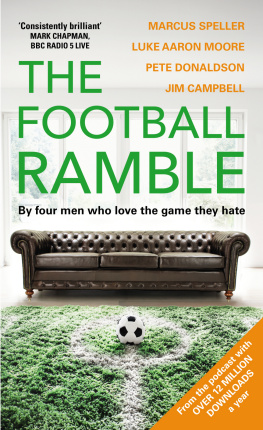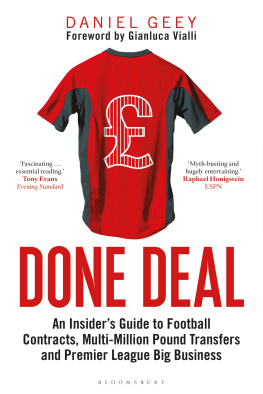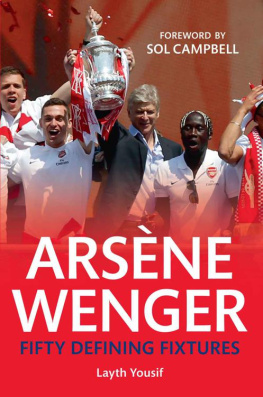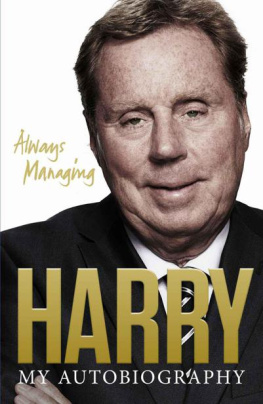HarperSport
An imprint of HarperCollinsPublishers
1 London Bridge Street
London SE1 9GF
www.harpercollins.co.uk
First published by HarperSport 2016
FIRST EDITION
Alan Curbishley 2016
Cover layout design HarperCollinsPublishers 2016
Cover illustrations Catherine Ivill AMA/Getty (Harry Kane); Andrew Yates/Getty (Ryan Giggs); Chris Williamson/Getty (Roy Hodgson); Julian Finney/Getty (David Sullivan); Andrew Powell/Getty (Steven Gerrard); Michael Regan/Getty (Jamie Carragher); EPA European Pressphoto Agency b.v./Alamy (Arsne Wenger); Jamie Garbutt/Getty (stadium background)
A catalogue record of this book is
available from the British Library
Alan Curbishley asserts the moral right to
be identified as the author of this work
All rights reserved under International and Pan-American Copyright Conventions. By payment of the required fees, you have been granted the nonexclusive, non-transferable right to access and read the text of this e-book on screen. No part of this text may be reproduced, transmitted, downloaded, decompiled, reverse engineered, or stored in or introduced into any information storage retrieval system, in any form or by any means, whether electronic or mechanical, now known or hereinafter invented, without the express written permission of HarperCollins e-books.
Find out about HarperCollins and the environment at
www.harpercollins.co.uk/green
Source ISBN: 9780007247646
Ebook Edition August 2016 ISBN: 9780008158163
Version: 2016-06-22
Contents
I cant remember exactly when I became hooked on football, but Im sure like many other kids it happened at a very young age. In fact I dont recall a time when football wasnt part of my life. It just seems to have always been there.
Ive been lucky enough to have been able to play the game professionally and continue in the sport as a coach and manager, but before all of that came along I was first and foremost a football fan. I still am. I was born and brought up close to Upton Park, and becoming a West Ham fan was never really in question for me or any of my mates. It was the club we all supported and the one we all hoped to be able to play for one day. I was fortunate to be considered good enough to train with them when I was a youngster, and privileged enough to be given match tickets to their home games. These were little green vouchers that allowed us to stand just behind where the dugouts were later positioned at the stadium. I would always try to make my way to the North Bank behind one of the goals and watch the matches from there. I remember some memorable matches looking on from those terraces, like the day Geoff Hurst scored six goals, including the first one, which he punched into the net, in an 80 win against Sunderland in 1968. I also watched on in despair as a great Manchester United side inflicted a 61 defeat on the Hammers in 1967, the season the visitors went on to win the league. So later on in my life being able to actually play for the club and manage it was something special.
Having the good fortune to be professionally involved in the game for most of my life has given me an insight into the workings of football in this country, and during that time I have seen the game grow, change and evolve from those matches I watched as a youngster in the 1960s to the industry it now is. I wanted to go behind the headlines and the general media coverage to try to shed some light on exactly what happens in the game. To interview the sort of people who are part of the fabric of the modern game in this country, and who play, or have played, important roles in what football is now about.
There are some very familiar names included, but equally there are others who are not so well known, and perhaps some who are not known at all outside of the game. However, they all share something in common, and thats football. There are many people involved in the game and who earn their living from it. They are part of what modern football is about, and although it would have been impossible to include everyone who plays a part, I have tried to speak to people who I believe can shed some light on the workings of the game at the top in this country.
Supporters see their favourite team or player running out onto the field each week, but might not have any idea about those involved in making sure that can happen people such as the coaches, the medical and sports science team, the player liaison officers and the kit men. They all play their part, and that is why I have tried to talk to a broad cross-section of people from the boardroom to the bootroom.
Things are always changing in football, with managers, players and others involved in the game moving on or changing clubs. The vast majority of the interviews I conducted took place in 2015, with the others happening in the early part of 2016. Although circumstances may have changed for some of the people I spoke to at the time, I hope the relevance of what they told me and the candid way in which they were prepared to speak about their roles within the game give the sort of insight that fans will be interested in.
Football at the highest level might now be an industry, but at the same time it is still a very simple game with very simple rules. The drama, spectacle, excitement, happiness and sadness that come along with it make it special for those of us who love it. Once youre hooked, football becomes an addiction and it stays with you for life.
Chapter 1
Sir Alex Ferguson, Arsne Wenger, Harry Redknapp, Chris Powell
When it comes to talking about football management in Britain there is probably only one place to start. If youve won two Champions League finals, a couple of European Cup Winners Cups, seventeen domestic league titles and fourteen domestic cup competitions, the chances are you know what youve been doing. Add to all of that a managerial career that lasted for almost forty years, twenty-seven of which were spent at Manchester United one of the biggest clubs in the world and you can see why Sir Alex Ferguson has rightly earned legendary status as one of the greatest managers of all time.
He took his first steps in management in 1974 with East Stirlingshire in Scotland, and then went on to have success with St Mirren, winning the Scottish First Division, before taking over at Aberdeen for eight years, during which time he won three Scottish Premier Division titles, four Scottish Cups, one League Cup and, perhaps most remarkably of all, the European Cup Winners Cup. During his spell at United he not only won the Champions League twice, he also guided his teams to an incredible thirteen Premier League titles in the space of twenty years. He built and rebuilt his United teams, producing an attacking brand of football that enabled the club to become consistent winners.
Throughout his time as a manager his fierce drive and determination to win stayed at the centre of what he was about, producing teams on either side of the border that were successful and entertaining. As a manager I faced Alexs teams on several occasions, and the one thing you could always be sure of was that they were going to come after you and attack, whether it was at Old Trafford or your own ground. His teams played in a certain way and were incredibly successful as a result.
It was the way I was, he says. At Aberdeen I always played with two wide players and at St Mirren I always played with two wide players, and I always had a player whod play off the centre-forward. When I started as a player I had a wee bit of pace, but when I got towards the end of my career I used to drop in and its a problem for defenders. Brian McClair was the first one to do it for me at United, when I had Mark Hughes with him. Then it was Hughes and Cantona, then it was Andy Cole and Cantona. Ive always done it.

